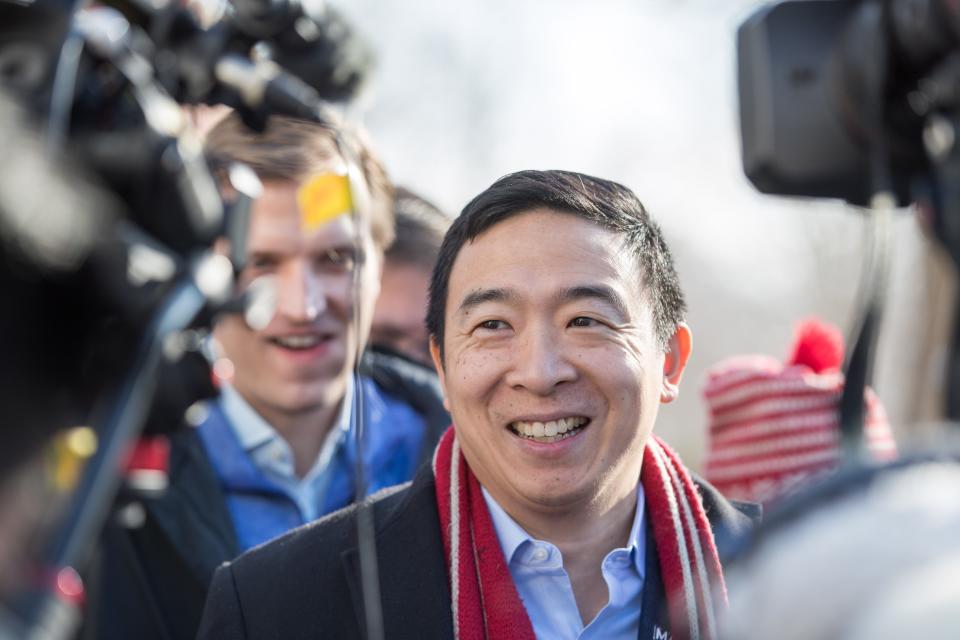Push for universal basic income will outlive Andrew Yang's 2020 presidential campaign
Andrew Yang focused his surprisingly successful long-shot presidential campaign on a seemingly radical policy idea: universal basic income, or giving people monthly cash payments with no strings attached. He has dropped out of the 2020 race, but the push for UBI will live on.
While the roots of this concept run through our country’s history, with supporters who include Thomas Paine and Martin Luther King Jr., Yang is rightly credited with moving the idea of unconditional cash out of think tanks and academia and into living rooms across the country.
It may sound Utopian at first, but the reality is that wages haven’t kept up with the cost of everything else. These cash infusions could go a long way toward ensuring that unstable work, the rising cost of living and the transition to automation don't leave people living in poverty.
The congressional 'cash squad'
Yang’s political journey is over for now, but several leaders are actively working on policies that put more money back in the hands of the poor and middle class. On Capitol Hill, Sen. Kamala Harris of California and Reps. Rashida Tlaib of Michigan, Bonnie Watson Coleman of New Jersey and Gwen Moore of Wisconsin make up a kind of “Cash Squad.”
Instead of a focus on automation, these lawmakers — all Democrats and women of color — are crafting policies that reflect the racial, gender and social justice power of a guaranteed income as envisioned by King, the Black Panthers and the National Welfare Rights Organization. These women are advancing real legislation on cash policies that would build an economic floor for millions of Americans struggling to make ends meet.

Shortly after Michael Tubbs, mayor of Stockton, California, announced a guaranteed income demonstration in his hometown last year, Harris figured out how to turn that idea into national policy.
Her LIFT the Middle Class Act, which puts up to $500 a month into the pockets of half of workers regardless of immigration status, pays for itself by repealing the reckless 2017 tax cut law signed by President Donald Trump and rebalancing the tax code so that the wealthy and corporations don’t get a free ride.
No fatalism allowed: Democrats can beat Trump with a progressive-centrist unity ticket
After coordinating with Harris on an earlier version, Tlaib introduced the BOOST Act last summer. This groundbreaking policy would give up to $500 a month to more than half of Americans, and is the first of these policies not tied to work. With this approach, even people with zero income, like people caring for elderly parents or young kids, or someone recently released from prison, qualify for the cash transfer policy.
Watson Coleman introduced the Earned Income Tax Credit (EITC) Modernization Act — a bill that, as the name suggests — modernizes, adapts and expands this credit. In particular, it recognizes the labor of unpaid family caregivers and low-income students by expanding the definition of work to include their contributions.
All Americans should be able to thrive
Moore recently introduced the Worker Relief and Credit Reform Act to give monthly cash payments to Americans. It would reach low-income families as well as those far into the middle class. Moore’s bill also recognizes the work of unpaid caregivers and low-income students by extending the payment to them. The expansiveness of her bill, which would benefit more than 40% of all Americans, would cut the country’s poverty rate by a third.
Andrew Yang: Being the free-money guy won't hurt me
These women have big bold visions for how to remedy the ills of income inequality, and they are pushing forward big bold legislation to get us closer to that vision. They are joined by dynamic community leaders like Aisha Nyandoro, who next month will be expanding her groundbreaking guaranteed income program — more than tripling the number of recipients — for black moms living in extreme poverty in Jackson, Mississippi.
In the face of rising inequality and the changing nature of work, these women are promoting proposals to use the existing tax code to create an income floor. Their pioneering policies put cash in people’s pockets so that millions of Americans can experience that vital combination of stability and flexibility.
The 2020 primary season may not usher in a presidential nominee focused on the power of cash, but the work under way from the federal to local level to push forward this idea should give us hope that a future in which all Americans are able to thrive is close at hand.
Natalie Foster is the co-chair and co-founder of the Economic Security Project. Follow her on Twitter: @nataliefoster
You can read diverse opinions from our Board of Contributors and other writers on the Opinion front page, on Twitter @usatodayopinion and in our daily Opinion newsletter. To respond to a column, submit a comment to letters@usatoday.com.
This article originally appeared on USA TODAY: Yang 2020 campaign is over but push for universal basic income goes on

